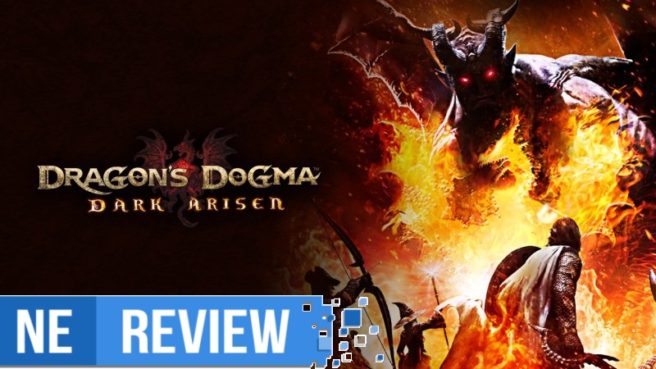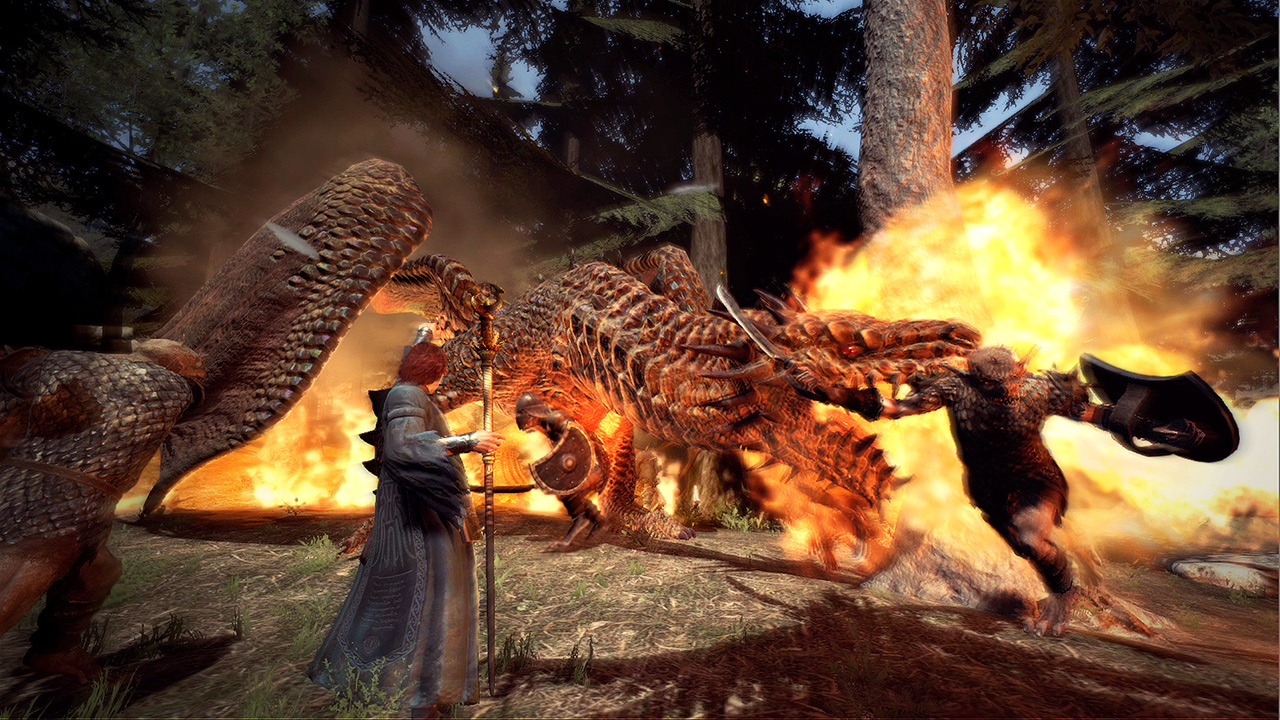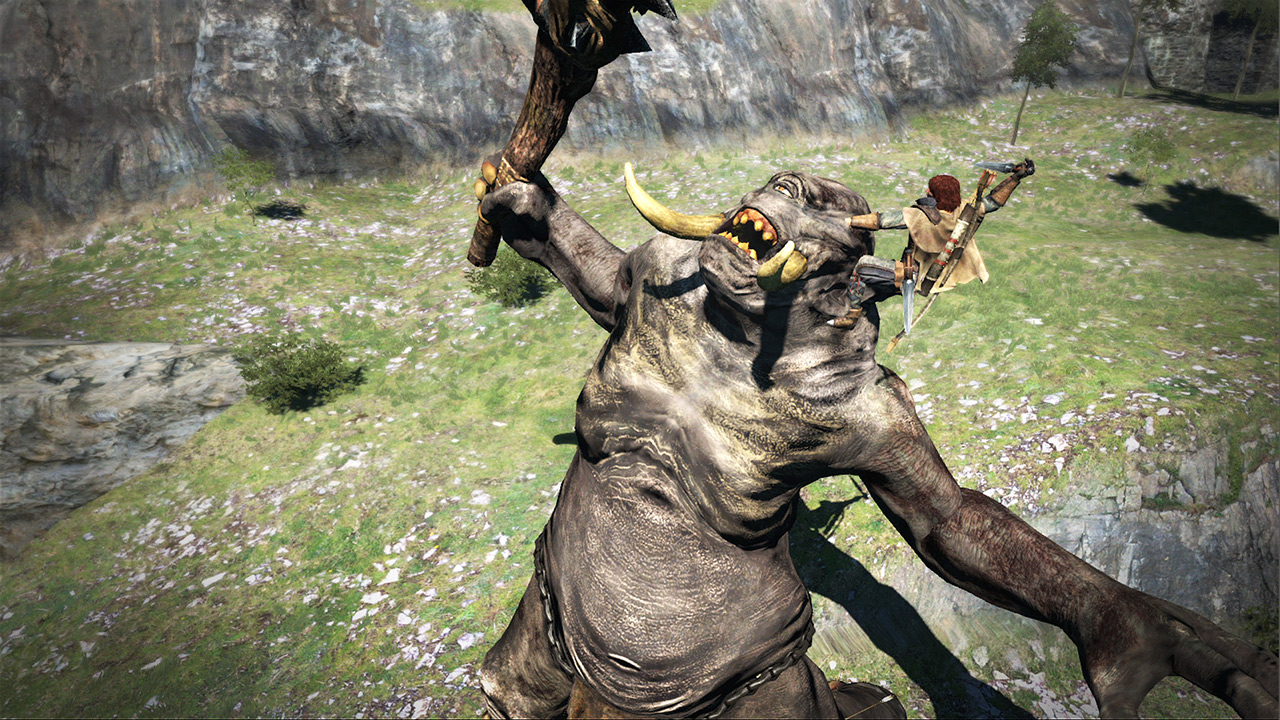System: Switch
Release date: April 23, 2019
Developer: Capcom
Publisher: Capcom
Imagine waking up, going down to your kitchen and seeing every utensil you own now suddenly has a different color and function. Your whisk? Slice your bread with it. Potato peeler? No, pizza cutter. That’s Dragons Dogma: Dark Arisen, a game that somehow manages to feel totally familiar and utterly unrecognizable all at the exact same time. There are flashes of familiarity to its design – Dark Souls, Skyrim, Monster Hunter and many others – but they all manage to exist as just that, flashes. Underneath the welcoming facade of these similarities there’s a game that will stick in your memory for the foreseeable future, for better and (sometimes) for worse. Originally released in 2012 for the PS3 and 360, Dragons Dogma: Dark Arisen was Capcom’s offering to the action RPG pantheon. Now, in 2019, it has made the jump to the Switch in a move almost as peculiar as the game itself – and remarkably, it works.
One of the main criticisms leveled at Dragon’s Dogma in the past has been that its narrative was flat and uninspired, and unfortunately nothing has changed in that regard. You play as the Arisen, an atypical custom character-chosen one who must journey to far off lands in search of the dragon who stole his/her heart. The writing is dull second rate fantasy patter, the voice acting does it zero favors and awkward pauses permeate the writer’s poor attempts to crowbar in as many uses of “aught” and “yonder” as their keyboard will allow. There are a handful of moderately interesting twists and turns, but ultimately the story feels unimportant and mostly inconsequential. If this were any other RPG these pitfalls would serve as a death sentence to the game’s overall quality. Thankfully, Dragons Dogma isn’t like most other RPGs in that it’s a game that is defined (and saved) by its phenomenal combat.
It says an awful lot about action RPGs in general when a 2012 title can still feel as good as it does in 2019. I genuinely can’t recall the last time I felt this connected to a game’s combat at a fundamental level. Dragons Dogma plays like nothing else on the market, so comparing it to the likes of Dark Souls or Monster Hunter – as I have done before – almost feels contrived. Yes those flashes of familiarity are there, but Dragons Dogma carves out a deeper layer of interaction for itself through some incredibly creative design. Every single weapon feels great to use, from swords and daggers to staffs and bows. They all occupy their own definitive space in the game and the level of care and attention that has gone into tuning their characteristics is evident from the second you take your first swing. Bows and magic staffs are a standout success too, because they sound bloody satisfying when you use them. Ultimately the combat serves to root you in the world of Dragons Dogma and lends a particular sense of interactivity that simply hasn’t been seen in any other open world RPG before or since.
Significant thought has also been given to your character’s movement, which is just as important as swinging a sword or casting a spell. Whether you’re out exploring the game’s Tolkien-esque open world of Gransys or locking horns with a 20 foot tall ogre, you always feel like you’re in control. That might sound like a given, but some of the game’s battles get hectic and even on the Switch’s tiny little analog sticks it never feels unwieldy or cumbersome. Exploration benefits from this too and there’s an interesting verticality to the game’s world that adds to the sense of immersion and believability. Buildings and structures can often be scaled in one way or another, with chests and other rewards lying in wait if you’re willing to throw caution to the wind and bunny hop between rooftops and ledges. That point in particular is a huge plus for the game since it feels like Capcom knew what people tend to try and do in open worlds and added an incentive for those willing to make the leap from terra firma.
This loops back around to combat, too, as melee characters can grab onto the bodies of larger enemies and scuttle around them like an irritating younger brother hanging out of his older siblings. I can’t overstate how amazing it is to have this mechanic as accessible as it is in Dragons Dogma. I’m used to seeing this kind of gameplay relegated to scripted events in other titles, but here you can just go nuts, jumping from limb to limb and swiping at the weaker points of monsters with a really impressive sense of scale. You do this roughly every 30 minutes or so and even after 40 hours with the game it never grew tiresome. It encourages you to play as fast and dirty as you can manage and I still run headlong into a graceful dive whenever I see anything with a health bar that’s physically larger than I am.
One of Dragons Dogma’s key plot points revolves around the use of Pawns. These are AI companions that accompany you on your adventure through Gransys and they prove integral to the gameplay as much as they do to the story. You can have up to three of them in your presence at any one time and they can use any and all of the abilities that you can, depending on their class. You constantly come across new Pawns either through stones that transport you to their realm or by just stumbling across them around Gransys and you can swap them out at will. From early on in the game you’re told that variety in your Pawn’s abilities is of the utmost importance and they ain’t lying. Failing to bring along the right Pawns can prove detrimental to your outcome and fine tuning their gear and abilities becomes more and more crucial as you progress. Overall the Pawns work well both independently and as a unit, routinely buffing your character and administering their strongest attacks whenever the time is right to do so. They work even better once you go into the options menu and turn off their chatter, otherwise they just. Keep. Talking.


